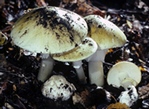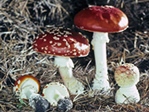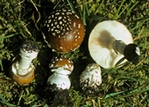Mushroom Poisonings in Dogs and Cats
Dogs and Cats and Mushrooms
Pets have been known to eat mushrooms in yards and while on walks. While 99% of mushrooms have little or no toxicity, the 1% that are highly toxic can cause life-threatening problems in pets. Take extra care to keep pets away from areas where mushrooms might be growing.
If you suspect that your pet has consumed a poisonous mushroom, contact your veterinarian, pet emergency hospital, or the animal poison control center (note: there is a fee for using this service). Once help has been secured, it is advisable to try to get the suspect mushrooms identified. NAMA provides a list of volunteers who are able to assist with identification in poisoning cases. It is best to get help if you are not familiar with mushroom identification.
Mushroom Toxins Affect Dogs and Cats Differently
Dogs take a special interest in both Amanita phalloides and Inocybe species, quite possibly because of their fishy odor. Amanita phalloides is well known to be a deadly species but Inocybe species and the Clitocybe species that also contain muscarine can be lethal to dogs. Muscarine has not caused any human fatalities that we are aware of and so dogs must be uniquely sensitive to this compound. Some Scleroderma species are also lethal to dogs (and pigs) but not to humans, but the toxin, to our knowledge, is not known.

Amanita phalloides

Amanita muscaria

Amanita pantherinoides
Both Amanita muscaria and Amanita pantherinoides are frequently eaten by dogs. They too have a fishy odor. The toxins ibotenic acid and muscimol are not lethal to humans but in rare instances can cause death in dogs. Though cats rarely consume mushrooms they are particularly attracted to dried Amanita muscaria and Amanita pantherinoides, sometimes with lethal results.
If a dog or cat has consumed Amanita muscaria or Amanita pantherinoides, the administration of atropine can intensify a coma-like sleep, greatly increasing the possibility of death.
See the NAMA Mushroom Poisoning Syndromes page for more specific information.
Patience Advised with Coma-Like Sleep
As is the case with humans, dogs typically go into a deep coma-like sleep a few hours after eating Amanita muscaria or Amanita pantherinoides. Recovery is generally complete about 6 hours (but as long as 72 hours) later. While doctors never euthanize humans while in a coma-like sleep, sometimes the decision to euthanize is made with dogs. In most cases, the dog will recover — so patience is advisable.
See an in-depth article on this topic, Animal Poisoning by Amanita pantherina and Amanita muscaria: A Commentary, by Michael Beug and Marilyn Shaw.
Dogs and Amatoxin Poisonings
A great many dogs dies each year from consuming mushrooms containing amatoxins. The symptoms are characterized by a 6-12+ hour delay in symptoms then severe GI distress and refusal to eat or drink (most often caused by ingestion of Amanita phalloides, Amanita bisporigera or Amanita ocreata, though the Galerina marginata group, the Conocybe filaris group and Lepiota subincarnata also contain amatoxins). In one recent California case, a dog was saved by aggressive rehydration therapy plus needle aspiration of the bile from the gall bladder (contact www.petsreferralcenter.com or phone 510-219-0112 for more information if you have a dog that you suspect has consumed amatoxins). For a review of treatment strategies, see “Amatoxin Poisoning in North America 2015-2016“.
What You Can Do
If your pet may have been poisoned by mushrooms, try to get a sample of the same mushroom or mushrooms from where they were found. This will help aid in identification.
Place any available material in a paper bag or waxed paper, not plastic and refrigerate until it can be examined. Note where the mushrooms were collected in case the mushrooms may have been contaminated by uptake of pesticides or heavy metals from lawns, roadsides or industrial areas.
It is important to file a report, even if the outcome was only a gastrointestinal upset. NAMA tracks ALL mushroom poisonings.
After the incident, help document mushroom poisonings by submitting an online report or mail-in report to the NAMA Poison Case Registry.
Other Resources
- NAMA Toxicology Report 2009
- Mushroom Poisoning in Dogs (for animal welfare professionals from ASPCApro.org)

NAMA Store >